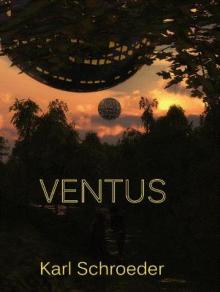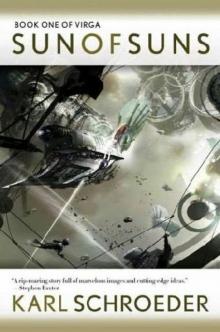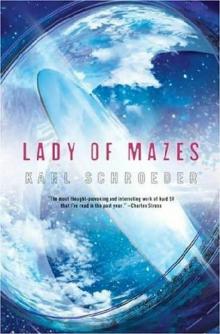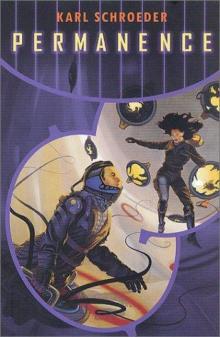- Home
- Karl Schroeder
Sun of Suns v-1 Page 17
Sun of Suns v-1 Read online
Page 17
"What are you talking about?"
He sighed. "Do you know anything about the people you're working for?"
Aubri narrowed her eyes, searching his face. "This is some sort of justification for why you wanted to abandon your friends, isn't it? They're bad people, so you're justified in only being in it for yourself, is that it?"
Angry now, he said, "I tried to save you. There's nothing for me out there. I haven't got a future. I just drought it might be worth saving the life of somebody who did have one."
"Then you picked the wrong person to save."
It took a few seconds for her words to register with Hayden. "W-what did you say?"
Aubri sighed heavily. "Listen, I don't need this right now. And I don't need your help at the moment, assistant. You know our machines are ready." She put her hand in the center of his chest and pushed. Confused and angry, Hayden let himself sail out the door.
Slew the carpenter had watched his exit and now smiled. "They're all trouble, kid. Take my word for it, that's as good as you're gonna get from her."
"Shut up." But Slew just laughed at him, and Hayden, ears burning, retreated to the hangar again.
* * * * *
FINDING ITSELF IN a stray beam of sunlight from distant Candesce, the capital bug shrugged awake. It unfolded its six legs and stretched them ineffectually into the cold air. There was nothing to grab on to for a hundred miles in any direction, but it didn't care much; it lived on stray flotsam and jetsam and could hibernate for months at a time. The heat of a sun could waken it, though, and as it felt the distant rays of Candesce it spread its diaphanous wings, and began to hum.
"Batten the hatches!" The Rook's new boatswain leaped from one side of the vessel to the other, following his own, order. The lads in the hangar were hastily dogging the doors as well; but it did little good. The world-shattering drone of the capital bug wormed its way into every nook and cranny of the ship. The crewmen cursed and clapped their hands over their ears, but the buzz seemed to resonate all the more inside their skulls. One by one, across the ship, the windup lantern flames flickered in the choppy air and went out.
Hayden had been asleep on his bedroll in the ship's centrifuge. He was used to all its noises now, and even the thunder from test firings and target practice couldn't wake him. But the sound of the capital bug had him instantly alert.
As he exited the now-shaking wheel he saw Travis's face floating in the solitary illumination of the last opened porthole. "Will you look at that!" said the officer—or at least, those were the words his mouth shaped. Hayden couldn't have heard him from six inches away.
Over the past few days Hayden had discovered that Travis liked or at least respected him. The feeling was mutual; the man didn't treat the presence of civilians on his ship as a threat to his authority. So Hayden didn't worry that he was tempting fate by putting his head next to Travis's and looking out the porthole.
Dots of cloud patterned the air around the capital bug, throwing small lozenges of shadow on the vast, distance-blue curve of its abdomen. That flank was all Hayden could really see at the moment; any details about the rest of the beast faded into darkness or blue to either side. Cruising up and down the vast wall of flesh were flocks of birds or fish, apparently immune to the drone that could kill any man who came too close. Closer to the Rook—only a few miles away—a number of large black spheres turned lazily in the sudden sunlight. These were surrounded by wreaths of yellowish mist and swarming dots.
The buzzing stopped, leaving a ringing silence that was, in its own way, just as painful as the noise.
Travis grinned. "That's a real capital bug, isn't it?" It sounded like he was on the other end of one of ale ship's speaking tubes.
Hayden nodded, digging in his ears and then checking his fingertips for blood. "Good thing we weren't any closer," he shouted.
"What're those things?" Travis pointed at the town-sized spheres of black in the middle distance.
"Bug shit," said Hayden. "You don't want to go near it. Great for growing mushrooms, though."
"I can't believe anything that huge could be alive."
"They're mostly empty space. A big balloon, like the world itself I guess. The bugs even have their own forests and lakes and stuff inside them, or so they say."
Travis gave one last wistful look out the porthole, then turned away to attend to his duties. Hayden stayed where he was as up and down the Rook then threw open the rest of the portholes. The heat of Candesce was very faint, but it was sunlight on his face, and its very presence was vastly soothing.
"Don't get too comfortable," said a voice next to him. Hayden turned, blinking, to find Lyle Carrier hovering in the shadows.
"What?"
"I know you think you've made friends in high places," said Carrier, nodding at Travis's retreating feet. "But it's not really that they trust you, you know. They're happy to smile and chat with you because they know I'm watching you."
Hayden scowled at him. "What's that supposed to mean?"
"There's a lot of unanswered questions about you, boy," Carrier said, his mouth pursed in a by now familiar moue of distaste. "And what answers you have given just don't add up. You see," he leaned in close, "I know you're up to something, and Venera knows I know. She has every confidence that I'll find out what it is. So she and your other betters are happy to indulge you for the moment. They know you're well taken care of."
Hayden stared back at him. It had taken him a long time to get Carrier's proper measure. He regretted not sizing the man up properly right at the beginning. Carrier was a killer; but Hayden wasn't afraid of him.
He cocked his head to one side. "You mean you've spent all this time skulking around watching me and formulating hypotheses on your own? And you never once thought to just ask?"
The slightest tremor passed over Carrier's left eyelid. It was enough discomposure to make Hayden smile.
"What are you up to, then?" said Carrier.
"None of your business," snapped Hayden. He turned back to the view.
"So that's the way you want to do it," murmured Carrier. "All right. Later, Griffin."
Hayden didn't hear him leave, but he refused to turn his head to check. For one thing, the sight outside was beautiful: the light from Candesce wasn't fading, if anything it was brightening, and no wonder for that was where the Rook and its sister ships were going.
But also, he didn't want Carrier to see his face right now. Carrier would have seen that Hayden knew he was now marked for death. You didn't insult a man like Lyle Carrier and get away with it.
So be it. Right now he needed an enemy he could hate unreservedly. His feelings about Admiral Fanning were too mixed to be satisfying. Carrier… that was another matter.
Hayden watched the Rook's sister ships skirting the precincts of the gargantuan capital bug. They set their prows in the direction of the Sun of Suns, and as the air continued to be clear and fortunately lighted, they all opened up their throttles and arrowed toward Candesce.
* * * * *
TWO DAYS LATER, and the way ahead was bathed in perpetual light. First one, then two, then four suns peeked out from behind the perpetual cloudbanks of winter. At first each was little more man an orange smear on the sky, its light diffused and filtered by hundreds of miles of air, water, and dust. Over the hours they sharpened, becoming in time tiny pinpricks of actinic light embedded in discs and arcs of silver and green which were the collective reflection of thousands upon thousands of individual houses, towns, forests, lakes, and farms.
Gridde, the ancient chart-master, emerged from his velvet-lined chamber to hold up prisms to the light of these suns. He examined the miniature rainbows so created and consulted tables in a huge book that he had carried strapped to his back for so long that it had permanently dented the shoulder of his jacket. Then he pointed at each of the suns in turn and said, "The Nation of Tracoune, the Principality of Kester, the March Collective of the Hero Reeve and, er, what was the other damn one… that one's t
he Upstart Breakaway Republic of Canso."
The crewmen who had gathered to watch this procedure nodded and muttered sagely to one another. Few had heard of any of these nations, and none had heard of all of them. They were halfway around the world from Slipstream and its neighbors. More importantly, these were countries that steered their way through the intermediate airs of Virga, hundreds of miles above the principalities of Candesce but hundreds more below the layers flown by Aerie and other familiar places. Between were layers of winter—dark, cold, and choppy air that had proven over the centuries to be unlucky for the founding of nations.
"Gridde told me it's because there's cyclones, jet streams," Martor said later. "Things drift apart too easy. I guess if they didn't there'd be no winter, just suns and countries packed from one end of the world to me other." He smiled wistfully. "Imagine that."
"Hmmpf." For lack of anything better to do, Hayden was polishing the racing bike for the tenth time. Now he looked at Martor with a sour expression. "There's too much junk floating around in civilized spaces. You can't take a bike above sixty miles an hour with-out getting somebody's discarded chamber pot in the forehead—or worse, the loose contents of one. Plus there's police every five miles waiting to ticket anybody who opens up their throttle. Far be it that you should rattle the windows of some rich man's house."
"I hadn't thought about it that way," said Martor.
"That's 'cause you haven't got enough bike time in yet. When you own your own someday you'll curse the density of civilized spaces."
Over the next few days Hayden's dim assessment of civilization was confirmed: the expeditionary force made little headway through increasingly populated air. Habitation began on the lowest level with basement spiders who wove long scarves of web that attracted flecks of soil and trash, gradually growing into rafts the size of dinner tables on which myriad other creatures thrived. The webs tangled in the Rook's vanes and had to be swept off with brooms. Birds, fish, and insects, most thumbnail-sized but some big as boats wove and ducked around the mats. As the light of the suns brightened the mats were seen to be festooned with grass and wildflowers. In the distance the watchmen began to spot trees and farms. And everywhere, now, there was ship traffic.
Most of the local suns followed the diurnal rhythm of Candesce, otherwise there would be no darkness here at all. Some renegades did use their own time scales, for historical or political reasons. The result was that the nights here were more glorious than any Hayden had known. The air and clouds deepened to azure tinged with shades of turquoise, mauve, and peach, and in this twilight a thousand town and house beacons glimmered. Hayden overheard Aubri say something about "the stars" as she gazed at the view from the Rook's hangar. He didn't approach her to find out what she meant.
Nor were there any fights or loud arguments among the men. A spell of grace had settled over the ships, all the more precious because they knew it wouldn't last. For a few days they were just airmen, entering strange and wonderful skies.
They didn't approach any of these suns; their destination lay farther in. The six cruisers threaded their way between border beacons, staying in international air as they approached the shell of civilization enshrouding the Sun of Suns. The principalities of Candesce became visible as a vast haze that curved away to all sides—the misty outline of a bubble hundreds of miles in radius with Candesce at its center.
The man-tended suns of the outlying nations fell behind as Candesce's radiance grew. Here were dense forests like gargantuan heads of broccoli, each dozens of miles in extent. There were equally big lakes, some shaped by scaffolding into lens shapes that focused the light of Candesce into town-sized zones of incandescence for industry or waste control. The air began to smell hot and rich with life.
This was the most ancient part of inhabited Virga. Candesce had been here since the founding of the world, and some of the nations now visible had existed almost as long. The crew traded stories of fabled places and legends, of town wheels made of solid gold and forests as big as nations. The air was speckled with ships in all directions, and now they even spotted flying humans, intrepid individuals using leg-powered wings mounted on their backs, like angels, to travel between towns and houses. Ship traffic became constrained by beacon lanes and the six Slipstream ships dutifully kept within their boundaries.
Finally Gridde emerged from his cell again and went to perch like some ragged black bird on a hangar door. He measured the angles between Candesce and the suns they had passed, and eventually nodded. "Gehellen," he announced, "lies two days journey that way." He pointed toward a part of the crescent of haze surrounding Candesce that looked to Hayden like any other part. As he folded himself back into the ship Hayden overheard him mutter to Admiral Fanning, "It's there that you'll find Leaf's Choir."
Two days later, the Rook and its sister ships stopped at a border beacon. The beacon itself was a wrought-iron and glass ball forty feet in diameter. Since it was day, its fires were banked, but the air smelled of kerosene for miles around. The lane markers had funneled all ship traffic into a choke-point here; all travelers had to pass near the rocket racks of an ancient, moss-encrusted fortress built of stone in a crude cube shape. Tethered to this were four baroque, heavily carven cruisers flying banners Hayden had never seen before.
As the Slipstream vessels arrived, a squadron of bikes exited the fortress and moved to surround them.The cruiser's engines coughed into life and they began to edge forward, blocking the way. And deep within the shadowed stones of the fortress itself, the noses of rockets slid into view.
"So," said Slew the carpenter, who was sitting with Hayden in the hangar, "welcome to Gehellen."
CHAPTER FIFTEEN
"… LADY AND BARON Castermond." Heads turned to acknowledge the new arrivals. Chaison Fanning bowed, but by now Venera couldn't be bothered. She looked beautiful today, so she could get away with bad behavior. She intended to.
This ballroom was a chamber to equal anything in Rush, constructed of stone and glass, with all the extra spin-up cost that implied; of course, grand reception halls were intended to intimidate. Anybody who thought their purpose more innocent was an idiot.
"You see? I told you all the best people would be here," said Ambassador Richard Reiss. Slipstream's representative in Gehellen was a portly man with a wine-stain birthmark on his cheek. He wore local apparel, with flounces at the wrists and ruffles at the throat. For once Venera Fanning was grateful for the austerity of Slipstream military uniform; her husband looked positively rakish next to the ambassador.
"It's just a shame that your exotic passenger wasn't able to attend," continued Reiss. "What was her name again?"
"Mahallan," said Chaison absently. He tilted his glass to greet someone he didn't know.
"She had… research to attend to," said Venera. "This isn't a holiday for us, Ambassador."
"Of course, of course. Nonetheless I'm glad we were able to throw this little soiree at such short notice." Reiss gently cupped Venera's elbow and led her toward a drinks table. "This evening's festivities could be essential to greasing the wheels of progress. You know, your ships…"
He hardly had to remind her. The Book and its sisters were sitting idle at the military shipyard on the other side of Gehellen's capital city of Vogelsburg. They had been there for three days now, ever since the Gehellen navy had escorted them in under watchful guns. Venera couldn't really blame them for being cautious; you didn't just let foreign warships traipse through your territory. Not with-out giving them every inspection and putting the question to their crews. Chaison should have thought of that before they got here.
Still… the delay did have its advantages. Venera's first sight of Vogelsburg had electrified her. She had dreamed of this place.
This was the weightless city she had visited in her sleep so many times—she was sure of it. Vogelsburg's buildings came in all shapes and sizes, but very few spun to provide local gravity. They had confectionery shapes, with many honeycombed sides, frescoes, stat
ues, and minarets that stuck out all over. They looked like the diatoms her oldest brother had once shown her in a microscope. Joined together by ropes and kept apart by their minarets, they jostled in slow motion in the perpetually golden light of distant Candesce, just like in the dream. Vogelsburg's people flitted like birds in their thousands between the shifting structures.
The people themselves made Venera uncomfortable. Only the rich and powerful had regular access to gravity in Gehellen. Even they were much taller than she was used to—spindly and bandy, for the most part, though some of the women achieved a state of ethereal grace whose effect on her husband she didn't fail to notice. The lower classes were instantly recognizable: the servants in this ballroom could barely lift their heads, much less the drinks and canapes they served. They loomed like giant spiders over their betters, appearing uncomfortable and worried.
Venera could understand this dichotomy as the result of a deliberate policy to keep the poor weak. History was rife with examples of aristocracy reserving physical health and power for themselves, after all. What disturbed her was the possibility that this state of inequality might have come about through simple neglect. That would imply a shameful decadence on the part of the principalities of Candesce.
As Reiss grazed over the drinks table, Venera took her husband's arm and leaned in close. "This is a very strange assemblage," she said.
"You've never been here before," muttered Chaison. "So how do you know?"
"It's the mix of people, dear. My father threw a little banquet like this once, for some of the outlying provinces' tax collectors. He brought them all together in one place, sealed the doors, and had them shot from the gallery."
Chaison gazed off into space. "Sounds like your father."
"Anyway, I don't like it. Look around yourself. We're cut off from the ships. All the officers are here. There's guards on the entrances."

 Ventus
Ventus Sun of Suns v-1
Sun of Suns v-1 Ashes of Candesce: Book Five of Virga
Ashes of Candesce: Book Five of Virga Queen of Candesce v-2
Queen of Candesce v-2 Lady of Mazes
Lady of Mazes Permanence
Permanence